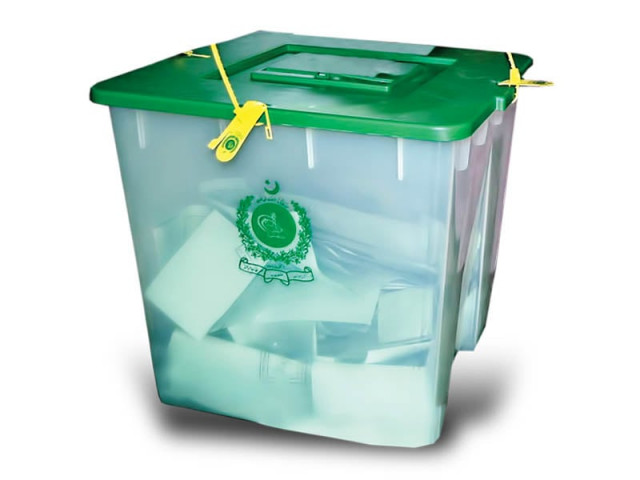Political parties complain they were not allowed to campaign freely
Karachi witnessed extensive campaign of religious parties

Elections Representational Image. PHOTO: FILE
Religious parties
The religious parties in the fray include the Muttahida Majlis-e-Amal (MMA), Tehreek-i-Labbaik Pakistan (TLP), Pakistan Sunni Tehreek, Rah-e-Haq Party and Milli Muslim League (MML) that has come up with the name of Allah-o-Akbar Tehreek.
The TLP and MMA have claimed that they held the largest number of rallies and corner meetings in the city.
Founded by Khadim Hussain Rizvi after the Faizabad dharna, the TLP is a new entrant to the electoral battleground. Despite its infancy, the party seems to have mobilised a significant portion of Barelvi vote bank in the city.
A TLP spokesperson, Muhammad Ali, claimed that the party arranged 1,100 rallies and 2,600 corner meetings across the metropolis during the electioneering period.
The TLP spokesperson, however, complained that the party was not given a level playing field for electioneering as a few parties were allowed by the authorities to violate the code of conduct for campaigning.
Last time the MMA entered into the electoral contest was the 2002 general elections. The alliance of religious parties proved to be a formidable opponent of the Muttahida Qaumi Movement in the city as it clinched five out of the city's 20 NA seats. The MMA also secured seven provincial assembly seats from Karachi.
Candidates limit election campaigns
Constituent parties of the MMA include Jamiat Ulema-e-Islam-Fazl, Jamaat-e-Islami (JI), Jamiat Ulema-e-Pakistan, Shia Ulema Council and Jamaat Ahl-e-Hadees.
A JI spokesperson Zahid Askari told The Express Tribune that the MMA held more than 2,000 corner meetings, numerous small and large scale gatherings and more than 2,000 election rallies in Karachi during campaign for the 2018 elections.
Askari lamented that the MMA was not being fairly treated as the authorities removed a large number of its flags and banners under the implementation of the code of conduct.
The Sunni Tehreek claimed that it held 50 corner meetings and more than 70 rallies in the metropolis. According to its spokesperson, Faheem Sheikh, the party also ran its election campaign in accordance with the code of conduct provided by the Election Commission of Pakistan.
According to its claims, Rah-e-Haq Party also did not lag behind other parties during electioneering. According to a party spokesperson, it held more than 1,200 corner meetings and staged more than 1,000 election rallies.
MML spokesperson and PS-111 candidate Muhammad Asif claimed that it had its 350 election offices opened across the city. According to Asif, the party organised over 250 rallies and more than 1,100 corner meetings.
Despite the tall claims of religious and other parties, the city did not witness the traditional election fervour and the overall campaigning remained dull.
PTI electioneering appeared lacklustre compared to others
The Pakistan Tehreek-e-Insaf (PTI) emerged as the second strongest party of Karachi in the 2013 elections after it bagged around an overwhelming 800,000 votes. However, it lacked proper organisational network to run its campaign in the city this time.
The PTI campaign, therefore, lacked discipline and coordination and it seemed that its candidates were canvassing for votes in their individual capacity.
Though vehicles painted with slogans of the party and pictures of its candidates could be seen plying on thoroughfares, the PTI seemed to be failing in reaching out to voters. Even in NA-243, the constituency from where its chief Imran Khan is contesting, the PTI did not appear vigorous in its campaign.
The lukewarm campaign suggests the party's failure in setting up an effective organisational structure in the city. The PTI could only set up between one and three offices for each constituency.
According to analysts, weak organisation of the PTI in Karachi was a major reason behind its electoral defeat in the city in the last elections, despite the fact that it came second in terms of the total number of votes bagged by various political parties. The party, however, did not rectify its shortcoming. Consequently, the party failed to run a large-scale election campaign in Karachi.
Election 2018: Candidates use innovative ways
No remarkable election rally was organised by the party during the past two weeks. Its candidates appear to be running their campaigns in their individual capacity.
The only National Assembly seat, the PTI secured from Karachi in 2013 elections was NA-250, comprising Defence and Clifton areas. The constituency has been merged with Saddar and it is now NA-247. The 2013 winning candidate, Arif Alvi, is again contesting but he reportedly faced backlash from residents when he started his campaign.
One of the constituencies where the PTI campaign seems visible and effective is NA-249 in which the party has fielded Faisal Vawda.
According to sources within the PTI, the party also faces a dearth of polling agents for the elections day.
"The campaign has mostly been carried out through text messages," a party source said, adding that no proper strategy was formed to meet people physically.
When PTI leader Imran Ismail was asked to comment on this, he rejected the impression that the PTI was lagging behind in its campaign. He claimed that the party had been running one of the most disciplined campaigns in the city.
The ECP's code of conduct has prevented the PTI and other parties to carry out election campaigns vigorously, Ismail said. "Parties can neither place banners nor posters within the city," he lamented, adding that the party was forced to restrict its electioneering to small corner meetings.
PSP goes all out, MQM-P lags behind
Formed only two years ago, the Pak Sarzameen Party (PSP) claimed to have organised an overwhelming 4,048 corner meetings in Karachi during its campaign for 2018 elections.
The PSP was formed after two disgruntled Muttahida Qaumi Movement leaders, Syed Mustafa Kamal and former deputy convener Anis Kaimkhani, returned to the country and announced to form a separate political party on March 3, 2016. Gradually, more and more disgruntled MPAs, MNAs, Rabita Committee members and other MQM leaders joined the PSP.
The PSP has fielded its candidates for all the 21 National Assembly and 44 provincial assembly seats of Karachi. Despite existing for only two years so far, the party formed an effective organisation due to which it was able to hold a high number of corner meetings in the city. In addition to 4,048 corner meetings, the party also set up over 1,200 offices and organised UC-level meetings and rallies in various parts of the city.
Another MQM-offshoot, the Mohajir Qaumi Movement-Haqiqi (MQM-H), is also in the run with full vigour. The party boycotted the 2013 elections.
The MQM-H has been on the political landscape of Karachi since 1992. It even secured a National Assembly seat in the 2002 elections. This time, the party held over 780 corner meetings and organised 65 rallies during its campaign.
MQM-H Chairperson Afaq Ahmed has repeatedly complained of not being allowed to carry out electioneering. "Banners installed by our workers are removed within moments," he lamented, adding that only some specific parties were allowed to freely conduct their campaign in the city.
Meanwhile, the MQM-P's campaign appeared weak compared to the past electioneering of the MQM. Reasons for it include its parting ways with its founder and internal rifts within the party that manifested in the form of Bahadurabad and PIB factions. The factions appear to have reconciled but the party has not fully recuperated from the fight for convenership between Dr Farooq Sattar and Dr Khalid Maqbool Siddiqui.
Though, it does not seem half as strong as it was in the past, the MQM-P is still a formidable force in the city. The party held several corner meetings and rallies during its campaign and there are various constituencies in the city where, according to political analysts, the party's defeat would be an upset.
PML-N launches election campaign with big promises to Karachiites
PPP, PML-N, ANP decry strict rules
Efforts were made to disrupt the Pakistan Peoples Party's (PPP) campaign in Sindh from Karachi to Kashmore.
PPP Sindh General Secretary Waqar Mehdi said this on Monday, the last day for campaigning, while taking to The Express Tribune.
According to Mehdi, security issues and the Election Commission of Pakistan's code of conduct were made excuses to refrain the PPP from campaigning.
The PPP was not allowed to hold a rally on MA Jinnah due to a rule that barred holding election activities on roads, Mehdi said. He added that the same rule was not applied to the Muttahida Qaumi Movement-Pakistan when it was granted permission to hold its rally on Liaquatabad Flyover.
The PPP leader, however, asserted that despite all the unfair treatment the party faced during electioneering, it would mark a landslide victory in the province.
The provincial chief of the Pakistan Muslim League-Nawaz, Shah Muhammad Shah, had similar complaints against authorities. He claimed that the party was not allowed to hold several corner meetings it had planned and its posters and banners were removed from several places.
Another PML-N leader, Khawaja Tariq Nazir, claimed that three political parties - Pak Sarzameen Party, Pakistan Tehreek-e-Insaf and Tehreek-e-Labbaik Pakistan - were given a free hand to carry out their programmes and restrictions were imposed on the rest of the parties.
Awami National Party (ANP) Sindh Secretary General Younus Buneri echoed the reservations of the PPP and PML-N leaders. According to him, the ANP had to wait for several days to get no objection certificates to hold corner meetings.
He claimed that the authorities further tightened restrictions after the Peshawar blast on an ANP corner meeting. According to Buneri, the ANP had to shift to door-to-door campaign because it could not get permissions easily to organise rallies or corner meetings.



















COMMENTS
Comments are moderated and generally will be posted if they are on-topic and not abusive.
For more information, please see our Comments FAQ